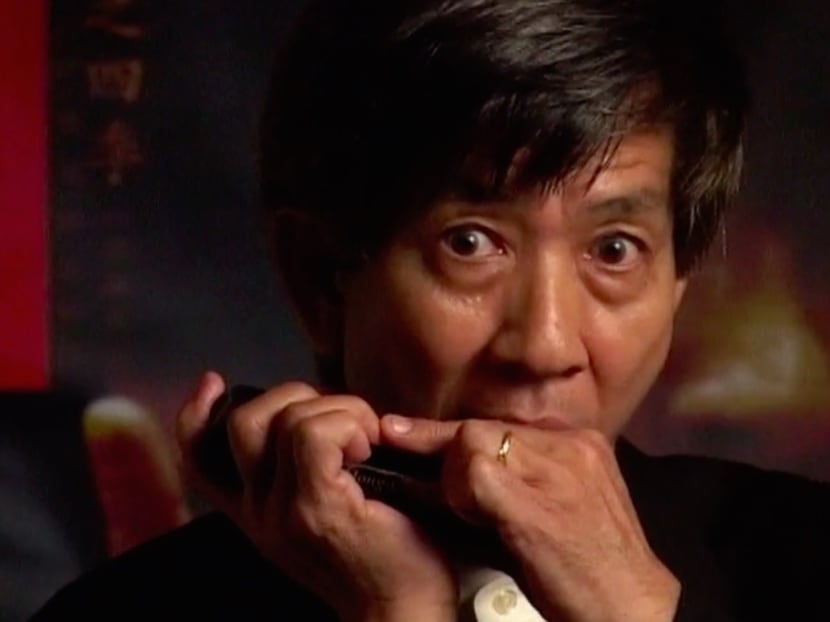Malaysian censors take issue with Singapore films
SINGAPORE — Local film-makers have withdrawn seven works from the Titian Budaya Festival in Kuala Lumpur after Malaysian censors asked them to make cuts to their films.

A screenshot from Singapore GaGa, a film that was supposed to have been shown in a joint programme in Kuala Lumpur this month.
SINGAPORE — Local film-makers have withdrawn seven works from the Titian Budaya Festival in Kuala Lumpur after Malaysian censors asked them to make cuts to their films.
Documentary film-maker Tan Pin Pin was the latest to do so, pulling Singapore GaGa when Malaysian censors recommended the deletion of the Malay word for “animal” in one scene as it was deemed a “security threat”.
Arguably the acclaimed documentary filmmaker’s best-known film, Singapore GaGa was slated to be part of a selection of films screened at the Singapore Film Festival segment of Titian Budaya, an arts festival showcasing Singapore talents in collaboration with Malaysian artists to mark 50 years of Singapore-Malaysia friendship.
According to Ms Tan’s Facebook post, the Film Censorship Board of Malaysia requested the deletion of “binatang-binatang”, the Malay word for “animal”, and the subsequent subtitles, in a section featuring the late Singapore ventriloquist Victor Khoo and his puppet Charlee. The censors cited the word’s possible “double meaning” as a reason, and that the “dialogue can create doubt and restlessness among citizens and finally may cause a security threat, disturbance of public peace and national defence”.
Festival organisers CultureLink had appealed the censors’ decision but it was rejected last week.
Singapore GaGa, which came out in 2005 and is rated PG with no cuts in Singapore, was screened in Kuala Lumpur in 2006. The film is Singapore’s first documentary to have a cinematic release and it enjoyed a seven-week sold-out run at The Arts House in Singapore. It has also played in film festivals around the world.
Commenting on her decision to pull the film, Ms Tan said: “Censorship is arbitrary. It depends on the agendas of each regime which evolves over time.
“It is unproductive for me to second-guess what is allowed. As a filmmaker, all I can do is to make the best film I possibly can,” she added. “There was very good response from the audience when Singapore GaGa was first screened in Malaysia. The Malaysian press gave it a good review as well. It’s a shame Singapore GaGa can't show in Malaysia at this event, but the film is available online on Vimeo."
The film selection for the Titian Budaya Festival was curated by The Singapore Film Society.
Apart from Singapore GaGa, three other Singapore films — Ken Kwek’s Unlucky Plaza, Liao Jiekai’s As You Were and the celebrated SG50 anthology 7 Letters — were also initially flagged by the censors.
TODAY understands that the censors requested eight to ten edits from Unlucky Plaza, including sex scenes and language; and one sex scene edit from As You Were. Both filmmakers decided to withdraw their films from the festival without appeal. A successful appeal was made by organisers against the cuts for 7 Letters (vulgar language “curse your whole family” in Cantonese in Jack Neo’s segment of the omnibus).
Back in November, Malaysian censors had also raised issues with four films curated in the festival’s short film segment — Ms Tan’s The Impossibility Of Knowing, Sun Koh’s Singapore Panda, James Khoo’s Hentak Kaki, and Wee Li Lin’s Autograph Book. The segment was scrapped after the four filmmakers decided to withdraw their works.
Commenting on the episode, vice chairman of The Singapore Film Society David Lee Fu Nang said: “It is the law of the land, and we respectfully work within these OB markers and rules and regulations.”
He added: “Film reaches out to so many people on so many levels and in so many ways, so it’s perceived as the art-form that is most sensitive.”
"This hasn’t deterred us. In fact, through this, we learn how better to navigate the waters for future events,” continued Mr Lee. “And through an open dialogue such as the public forum at the festival, that we hope to achieve better understanding among all the stakeholders - filmmakers, regulators, and the viewing public.”
The above-mentioned open forum, entitled Cross Causeway Cinema: Opportunities and Challenges, is also part of the Titian Budaya Singapore Film Festival programme. To be held on Jan 16 in KL, it will feature Singaporean filmmakers Royston Tan and Sanif Olek alongside their Malaysian counterparts Dain Said and Liew Seng Tat as panellists.
Organised by the Ministry of Culture, Community and Youth, Singapore, and supported by the Ministry of Tourism and Culture, Malaysia, the Titian Budaya Festival was officially opened by Singapore’s Prime Minister Lee Hsien Loong and Malaysia’s Prime Minister Najib Razak on Nov 20 last year.
The inaugural Singapore Film Festival, which is to be held from Jan 14 to 17, is the closing event of the three-month-long showcase and will feature a host of landmark Singapore films including Eric Khoo’s seminal 1997 film 12 Storeys, Anthony Chen’s multi-award winning Ilo Ilo and Sanif Olek’s musical film Sayang Disayang.








